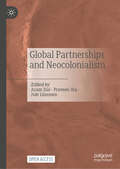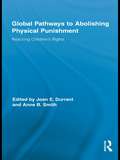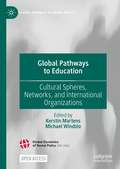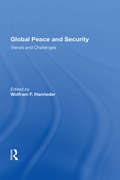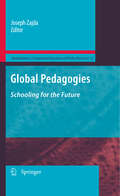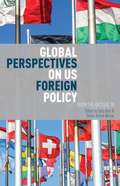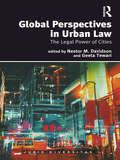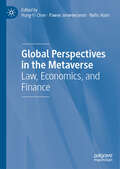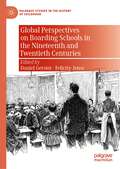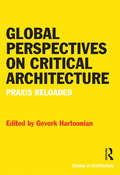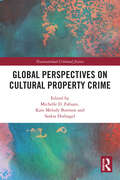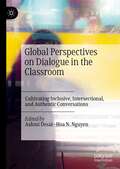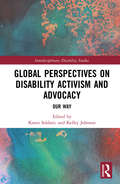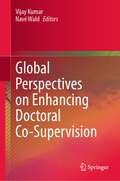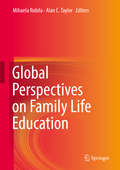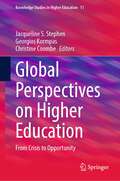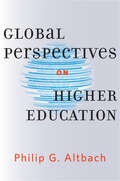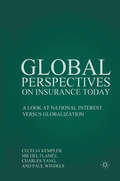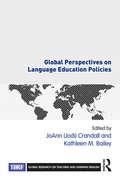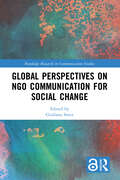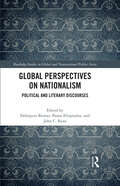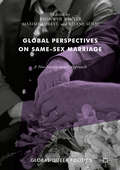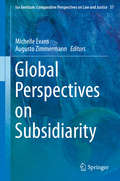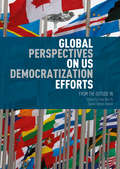- Table View
- List View
Global Partnerships and Neocolonialism
by Praveen Jha Aram Ziai Jule LümmenThis open access book points at some of the problematic aspects of international partnerships that continue to be shaped by colonialism. A &“global partnership for sustainable development&” is the 17th of the Sustainable Development Goals (SDGs). However, research points to shortcomings and problematic aspects of international partnerships that have been shaped by colonialism and continue to reflect unequal power relations between the global North and South. Hence, the chapters of this edited volume explore how global partnerships can be established in a neocolonial environment in the fields of development cooperation, the global economy and knowledge production. The contributions were written by members of the Global Partnership Network (GPN), one of the Centres of Excellence for Exchange and Development funded by the German Ministry for Development Cooperation, which has been working intensively and critically on the topic of partnerships and North-South relations over the past four years.
Global Pathways to Abolishing Physical Punishment: Realizing Children’s Rights (Routledge Research in Education)
by Anne B. Smith Joan E. DurrantThis book describes the unfolding of a global phenomenon: the legal prohibition of physical punishment of children. Until thirty years ago, this near-universal practice was considered appropriate, necessary and a parental right. But a paradigm shift in conceptions of childhood has led to a global movement to redefine it as violence and as a violation of children’s rights. Today, many countries have prohibited it in all settings, including the home. This remarkable shift reflects profound cultural changes in thinking about children and their development, parent-child relationships, and the role of the state in family life. It has involved actors in many sectors, including academia, government, non-governmental organizations and children themselves. Documenting the stories of countries that have either prohibited corporal punishment of children or who are moving in that direction, this volume will serve as a sourcebook for scholars and advocates around the world who are interested in the many dimensions of physical punishment and its elimination.
Global Pathways to Education: Cultural Spheres, Networks, and International Organizations (Global Dynamics of Social Policy)
by Kerstin Martens Michael WindzioIn this open access volume, the editors identify the trajectories and patterns displayed by education systems and investigate the causes of change from a global and historical perspective. The contributors argue that the emergence and development of education systems can be traced back to inherent national factors, as well as to the international diffusion of ideas.The research presented in this volume is a wide-ranging analysis and explanation of the dynamics of emergence, diffusion, and change in relation to state education systems. The chapters offer an empirical investigation into whether the global diffusion of Western-rational educational content and organizational forms occurs as expected by neoinstitutionalist theory, or whether culturally specific developmental paths dominate in different parts of the world.The book will be of interest to students and researchers in various social science disciplines, including social policy, education, sociology, political science, international relations, organizational theory, and economics.
Global Peace And Security: Trends And Challenges
by Wolfram F HanriederFocusing on the social, economic, and political structures of the postwar global order, this collection of essays discusses the search for a new international economic order, the transformation of the nation-state and the international balance of power, the technological and strategic dimensions of the nuclear age, East-West trade and technology tr
Global Pedagogies
by Joseph ZajdaGlobal Pedagogies: Schooling for the Future, which is the twelfth volume in the 12-volume book series Globalisation, Comparative Education and Policy Research, presents scholarly research on major discourses in comparative education research with reference to globalisation, educational policy and classroom pedagogy. It is a sourcebook of ideas for researchers, practitioners and policy makers in education, globalisation, global pedagogies and schooling for the future around the world. The aim of the book is to provide an easily accessible, practical yet scholarly source of information about the international concern in the field of globalisation, global pedagogies, and educational transformation. Readers will find here the very latest thinking on globalisation, global pedagogies and educational transformation in the context of global culture. It offers a timely overview of current issues affecting discourses pertaining to global pedagogies and policy research in the global culture. It provides directions in education, and policy research, relevant to transformational educational reforms in the 21st century. The book critically examines the overall interplay between comparative education discourses, globalisation, and education. It draws upon recent studies in the areas of globalisation, equity, social justice, and the role of the State. It explores conceptual frameworks and methodological approaches applicable in the research covering the State, globalisation, equity, and education. It demonstrates the neo-liberal ideological imperatives of education and policy reforms, and illustrates the way the relationship between the State and education policy affects current models and trends in education reforms and schooling globally. Various book chapters critique the dominant discourses and debates pertaining to comparative education discourses and the newly constructed and re-invented models of neo-liberal ideology in education. Using a number of diverse paradigms in comparative education research, ranging from critical theory to globalisation, the authors, by focusing on globalisation, ideology and democracy, attempt to examine critically both the reasons and outcomes of education reforms, policy change and transformation and provide a more informed critique on the Western-driven models of accountability, quality and school effectiveness. The book draws upon recent studies in the areas of equity, cultural capital and dominant ideologies in education.
Global Perspectives On Us Foreign Policy
by Sally Burt Daniel Añorve AñorveThis book explores aspects of US foreign policy, including the development process as well as the policy itself in respect to various countries and regions and some significant issues around the globe today. Providing insight into non-US perspectives of American foreign policy, the book contextualizes the effects of policy on external nations.
Global Perspectives in Urban Law: The Legal Power of Cities (Juris Diversitas)
by Nestor M. Davidson Geeta TewariThe growing field of urban law demands a collaborative scholarly focus on comparative and global perspectives. This volume offers diverse insights into urban law, with emerging theories and analyses of topics ranging from criminal reform and urban housing, to social and economic inequality and financial crises, and democratization and freedom for individual identity and space. Particularly now, social, economic, and cultural issues must be closely examined in conjunction with the rule of law not only to address inadequate access to basic services, but also to construct long-term plans for our cities and our world—a bright, safe future.
Global Perspectives in the Metaverse: Law, Economics, and Finance
by Nafis Alam Hung-Yi Chen Pawee JenweeranonThe metaverse is undergoing rapid and transformative changes, yet it has thus far lacked a comprehensive scholarly examination from a global and comparative standpoint. The publication addresses existing gaps by introducing fresh perspectives and frameworks across various domains within the metaverse, including law, economics, and finance. Drawing upon the expertise of an international cohort of scholars and practitioners, this volume illuminates emerging interdisciplinary insights with global relevance, facilitating a comparative analysis of diverse aspects of the metaverse. Timely and essential, this book contributes significantly to the metaverse literature, addressing urgent issues in this evolving landscape.
Global Perspectives on Boarding Schools in the Nineteenth and Twentieth Centuries (Palgrave Studies in the History of Childhood)
by Felicity Jensz Daniel GersterIn the nineteenth and twentieth centuries, thousands of pupils attended boarding schools in various places across the globe. Their experiences were vastly different, yet they all had in common that they were separated from their families and childhood friends for a period of time in order to sleep, eat, learn and move within the limited spatial sites of the boarding school. This book frames these ‘boarding schools’ as a global and transcultural phenomenon that is part of larger political and social developments of European imperialism, the Cold War, and independence movements. Drawing together case studies from colonial South Africa, colonial India, Dutch Indonesia, early twentieth-century Nigeria, Fascist Spain, Ghana, Nazi Germany, nineteenth-century Ireland, North America and the Soviet Union, this edited collection examines the ways in which boarding schools extracted pupils from their original social background in order to train, mold and shape them so that they could fit into the perceived position in broader society. The book makes the broader argument that framing boarding schools as a global phenomenon is imperative for a deepened understanding of the global and transnational networks that linked people as well as ideas and practices of education and childhood in the nineteenth and twentieth centuries.
Global Perspectives on Critical Architecture: Praxis Reloaded
by Gevork HartoonianJudging from the debates taking place in both education and practice, it appears that architecture is deeply in crisis. New design and production techniques, together with the globalization of capital and even skilled-labour, have reduced architecture to a commodified object, its aesthetic qualities tapping into the current pervasive desire for the spectacular. These developments have changed the architect’s role in the design and production processes of architecture. Moreover, critical architectural theories, including those of Breton, Heidegger and Benjamin, which explored the concepts of technology, modernism, labour and capital and how technology informed the cultural, along with later theories from the 1960s, which focused more on the architect’s theorization of his/her own design strategies, seem increasingly irrelevant. In an age of digital reproduction and commodification, these theoretical approaches need to be reassessed. Bringing together essays and interviews from leading scholars such as Kenneth Frampton, Peggy Deamer, Bernard Tschumi, Donald Kunze and Marco Biraghi, this volume investigates and critically addresses various dimensions of the present crisis of architecture. It poses questions such as: Is architecture a conservative cultural product servicing a given producer/consumer system? Should architecture’s affiliative ties with capitalism be subjected to a measure of criticism that can be expanded to the entirety of the cultural realm? Is architecture’s infusion into the cultural the reason for the visibility of architecture today? What room does the city leave for architecture beyond the present delirium of spectacle? Should the thematic of various New Left criticisms of capitalism be taken as the premise of architectural criticism? Or alternatively, putting the notion of criticality aside is it enough to confine criticism to the production of insightful and pleasurable texts?
Global Perspectives on Cultural Property Crime (Transnational Criminal Justice)
by Michelle D. Fabiani, Kate Melody Burmon and Saskia HufnagelThis book provides transnational insight into cultural property crimes and the cutting-edge work tackling issues ranging from currency crimes to innovative research methods. The volume brings together authors from a number of fields to address contemporary issues and advances in the fight against cultural property crime. It combines the perspectives of law enforcement officials, researchers, journalists, lawyers, and scholars, with specialities in the disciplines of criminology, law, archaeology, museum studies, political science, and economics, from countries all around the globe. This allows for a more comprehensive examination of issues facing these professionals and highlights similarities between the challenges encountered in different disciplines as well as in diverse locations. It seeks to disseminate the most current work in this field from a broad array of viewpoints in order to further facilitate an exchange of ideas and lay the groundwork to inspire future collaborations. Most significantly, it provides more specific suggestions for moving forward that could help assist stakeholders to connect and work directly with each other, despite international borders and discipline-related boundaries. The book will be a valuable resource for researchers, practitioners, and policymakers working in the area of cultural property crime.
Global Perspectives on Dialogue in the Classroom: Cultivating Inclusive, Intersectional, and Authentic Conversations
by Ashmi Desai Hoa N. NguyenThis book explores globally-informed, culturally-rooted approaches to dialogue in the classroom. It seeks to fill gaps in communication and education literature related to decolonizing dialogue and breaking binaries by decentering Eurocentric perspectives and providing space for dialogic practices grounded in cultural wealth of students and teachers. We first describe the book’s genesis, contextualize dialogue within the global impact of the COVID-19 pandemic, and share guiding concepts of inclusion, intersectionality, and authenticity in dialogue and pedagogy. We also distinguish dialogue from other practices and times in which dialogue may not be possible. The book brings fresh and urgent perspectives from authors across different disciplines, including ceramics, religious studies, cultural studies, communication, family therapy, and conflict resolution. The chapters distill the idea of dialogue within contexts like a bible circle, university sculpture studio, trauma and peacebuilding program, and connect dialogue to teaching, learning, and emerging ideas of power disruption, in-betweenness, and relationality.
Global Perspectives on Disability Activism and Advocacy: Our Way (Interdisciplinary Disability Studies)
by Kelley Johnson Karen SoldaticThis book explores the diverse ways in which disability activism and advocacy are experienced and practised by people with disabilities and their allies. Contributors to the book explore the very different strategies and campaigns they have used to have their demands for respect, dignity and rights heard and acted upon by their communities, by national governments and the international community. The book, with its contemporary global focus, makes a significant contribution to the field of disability and social justice studies, particularly at a time of major social, political and cultural upheaval. Global Perspectives on Disability Activism and Advocacy offers a significant intervention within the field of disability at a time of major social upheaval where actors, advocates and activists are seeking to hold onto existing claims for rights, equality and disability justice.
Global Perspectives on Enhancing Doctoral Co-Supervision
by Vijay Kumar Navé WaldThis book examines the shift in doctoral co-supervision from traditional hierarchical approaches to team-based models. Authored by international experts in doctoral education, the 14 case studies critically assess co-supervision within distinct institutional and national contexts, and indicate shifts in doctoral education and the rise of co-supervision models. The case studies offer insights into national and institutional policies, mentoring programs, workload distribution, conflict mitigation, and the intricacies of co-supervision, including role management and power dynamics. The book also highlights challenges and proven good practices for academics who are considering or experiencing co-supervision.
Global Perspectives on Family Life Education
by Alan C. Taylor Mihaela RobilaThis expansive reference examines the many types of Family Life Education (FLE) programs being offered around the world, reflecting a myriad of cultures and contexts. Coverage identifies core FLE content areas including parenting education, human sexuality, and interpersonal relationships, and details their programming in various countries over six continents, the Caribbean, and the Middle East. Contributors discuss complex challenges of program design, implementation, and evaluation, as well as connections between FLE and family prevention and intervention services. This knowledge is of great theoretical and practical utility across various fields, and is of particular interest to those developing programs for diverse populations.This unique volume:Presents in-depth information on Family Life Education programs from different countries around the world.Discusses how the socio-historic, political, and economic context of a country impacts its families and family services and programs.Covers current topics including poverty, domestic violence, and immigration.Encourages best practices and thorough understanding of the country/region.Offers recommendations for family service providers. Global Perspectives on Family Life Education is a trove of vital knowledge benefitting scholars and researchers as well as professors, postgraduates, graduate and undergraduate students, and practitioners in the family sciences, family life education, family therapy, social work, child and family studies, psychology, sociology, social work, cultural studies, and urban studies.
Global Perspectives on Higher Education: From Crisis to Opportunity (Knowledge Studies in Higher Education #11)
by Christine Coombe Georgios Kormpas Jacqueline S. StephenThis edited volume explores the impact of recent events worldwide that commanded rapid transformation with the areas of teaching, learning, assessment, administration, and academic support systems in today’s higher education institutions globally. It draws on a range of theories and research to provide global perspectives on student and instructor-centered approaches, such as, teaching, learning, assessment, technology use, student and instructor success, curriculum and instructional design, professional development, and academic and administrative support systems. The chapters in this volume capture the personal experiences of educators, educational support professionals, and emerging teachers who encountered crises in the form of disruptions (i.e., COVID-19 pandemic), advancements (i.e., technology), and transformations (i.e., practices, procedures). Educators, administrators, and policymakers benefit by learning about the ways other institutions of higher education continue to adapt to address emerging gaps.The 33 chapters in this volume were authored by international researchers, practitioners, and experts from 20 countries. This diverse group of authors share their experiences in creating opportunities from challenges to address gaps in higher education exposed by disruptions from the external and internal environments.
Global Perspectives on Higher Education: Insights From Key Global Publications (Global Perspectives On Higher Education Ser. #36)
by Philip G. AltbachThe single best book on higher education as a global phenomenon.Over the past half-century, globalization has had a profound impact on postsecondary education. The twin forces of mass higher education and the global knowledge economy have driven an unprecedented transformation. These fundamental changes have pulled in opposite directions: one pushes for wider access and accompanying challenges of quality, the other toward exclusive, "world class" research-oriented universities. In Global Perspectives on Higher Education, renowned higher education scholar Philip G. Altbach offers a wide-ranging perspective on the implications of these key forces and explores how they influence academe everywhere. Altbach begins with a discussion of the global trends that increasingly affect higher education, including the implications of mass enrollments, the logic of mass higher education systems around the world, and specific challenges facing Brazil, Russia, India, and China. He considers the numerous implications of globalization, including the worldwide use of the English language, university cross-border initiatives, the role of research universities in developing countries, the impact of the West on Asian universities, and the expansion of private higher education.Provocative and wide-ranging, Global Perspectives on Higher Education considers how the international exchange of ideas, students, and scholars has fundamentally altered higher education.
Global Perspectives on Insurance Today
by Charles Yang Cecelia Kempler Michel Flamée Paul WindelsThe book's contributors offer their unique perspectives on challenges confronting the insurance industry and how attendant risks can be most effectively managed.
Global Perspectives on Language Education Policies (Global Research on Teaching and Learning English)
by Kathleen M. Bailey JoAnn Jodi CrandallPresenting research on language policy and planning, with a special focus on educational contexts in which English plays a role, this book brings readers up-to-date on the latest developments in research, theory, and practice in a rapidly changing field. The diversity of authors, research settings, and related topics offers a sample of empirical studies across multiple language teaching and university contexts. The fifth volume in the Global Research on Teaching and Learning English series, it features access to both new and previously unpublished research in chapters written by TIRF Doctoral Dissertation Grant awardees and invited chapters by respected scholars in the field.
Global Perspectives on NGO Communication for Social Change (Routledge Research in Communication Studies)
by Giuliana SorceThis book examines the central role media and communication play in the activities of Non-Governmental Organizations (NGOs) around the globe, how NGOs communicate with key publics, engage stakeholders, target political actors, enable input from civil society, and create participatory opportunities. An international line-up of authors first discuss communication practices, strategies, and media uses by NGOs, providing insights into the specifics of NGO programs for social change goals and reveal particular sets of tactics NGOs commonly employ. The book then presents a set of case studies of NGO organizing from all over the world—ranging from Sudan via Brazil to China – to illustrate the particular contexts that make NGO advocacy necessary, while also highlighting successful initiatives to illuminate the important spaces NGOs occupy in civil society. This comprehensive and wide-ranging exploration of global NGO communication will be of great interest to scholars across communication studies, media studies, public relations, organizational studies, political science, and development studies, while offering accessible pieces for practitioners and organizers.
Global Perspectives on Nationalism: Political and Literary Discourses (Routledge Studies in Global and Transnational Politics)
by Debajyoti BiswasGlobal Perspectives on Nationalism takes an interdisciplinary approach informed by recent theorisations of nationalism to examine perennial questions on the topic. The idea of nationalism centres on questions of ethnicity, culture, religion, language, and access to resources. What determines consciousness of nationalism? How is nationalism manifested, shaped, or countered through literary and cultural productions? The contributors highlight topical areas in studies of nationalism including ecology, natural resources, sustainability, globalisation, the Anthropocene, postcolonialism, indigeneity, folklore, popular culture, and queer theory. They develop innovative perspectives on nationalism through in-depth analyses of the theoretical, political, literary, linguistic, cultural, and ecological dimensions of nationalism in Argentina, Australia, Bangladesh, Bosnia and Herzegovina, China, Germany, Greece, India, Indonesia, Lebanon, Nepal, Nigeria, Poland, Scotland, Turkey, the United States, and elsewhere. This volume underscores the importance of generative dialogue between disciplines in assessing the implications of nationalism for everyday life through five thematic sections: (I) Ethnicity, Ideology, and Narration; (II) Religion, Identity, and Heritage; (III) Linguistics, Tradition, and Modernism; (IV) Music, Lyricism, and Poetics; and (V) Ecology, Environment, and Non-Human Lives. This book will be of particular value to students and researchers in philosophy, literary studies, and political theory with interests spanning ecology, ethnicity, folklore, gender, heritage, identity, linguistics, nationalism, nationhood, religion, and sexuality.
Global Perspectives on Orhan Pamuk
by Mehnaz M. Afridi David M. BuyzeExplores existential and political themes in Orhan Pamuk's work and investigates the apparent contradictions in an arena where Islam and democracy are often seen as opposing and irreconcilable terms. Existential themes delve into literary nuances in Pamuk that discuss love, happiness, suffering, memory and death.
Global Perspectives on Same-Sex Marriage: A Neo-Institutional Approach (Global Queer Politics)
by Maxime Forest Bronwyn Winter Réjane SénacThis book provides a comparative, neo-institutionalist approach to the different factors impacting state adoption of—or refusal to adopt—same-sex marriage laws. The now twenty-one countries where lesbians and gay men can legally marry include recent or longstanding democracies, republics and parliamentary monarchies, and unitary and federal states. They all reflect different positions with respect to religion and the cultural foundations of the nation. Countries opposed to such legalization, and those having taken measures in recent years to legally reinforce the heterosexual fundaments of marriage, present a similar diversity. This diversity, in a globalized context where the idea of same-sex marriage has become integral to claims for LGBTI equality and indeed LGBTI human rights, gives rise to the following question: which factors contribute to institutionalizing same-sex marriage? The analytical framework used for exploring these factors in this book is neo-institutionalism. Through three neo-institutionalist lenses—historical, sociological and discursive—contributors investigate two aspects of the processes of adoption or opposition of equal recognition of same-sex partnerships. Firstly, they reveal how claims by LGBTIQ movements are being framed politically and brought to parliamentary politics. Secondly, they explore the ways in which same-sex marriage becomes institutionalized (or resisted) through legal and societal norms and practices. Although it adopts neo-institutionalism as its main theoretical framework, the book incorporates a broad range of perspectives, including scholarship on social movements, LGBTI rights, heterosexuality and social norms, and gender and politics.
Global Perspectives on Subsidiarity
by Michelle Evans Augusto ZimmermannGlobal Perspectives on Subsidiarity is the first book of its kind exclusively devoted to the principle of subsidiarity. It sheds new light on the principle and explores and develops the many applications of the principle of subsidiarity. The book provides a comprehensive overview of the principle in all its facets, from its philosophical origins in the writings of Aristotle and Aquinas, to its development in Catholic social doctrine, and its emergence as a key principle in European Union Law. This book explores the relationship between subsidiarity and concepts such as sphere sovereignty and social pluralism. It analyses subsidiarity in light of globalisation, federalism, democracy, individual rights and welfare, and discusses subsidiarity and the Australian, Brazilian and German Constitutions.
Global Perspectives on US Democratization Efforts
by Sally Burt Daniel Aňorve AňorveThis edited volume follows up from Global Perspectives on US Foreign Policy: From the Outside In in providing unique perspectives on US foreign policy from citizens of countries affected. This approach allows the voices of those less commonly heard to be presented as part of the broader debate about US democracy assistance policies around the globe. Contributions from experts in the Middle East, Africa, the Americas, and Eastern Europe are included to ensure the most pressing issues of international relations in our time are addressed. This book should be read by anyone interested in the United States and global politics as it provides a fuller view of the world.
